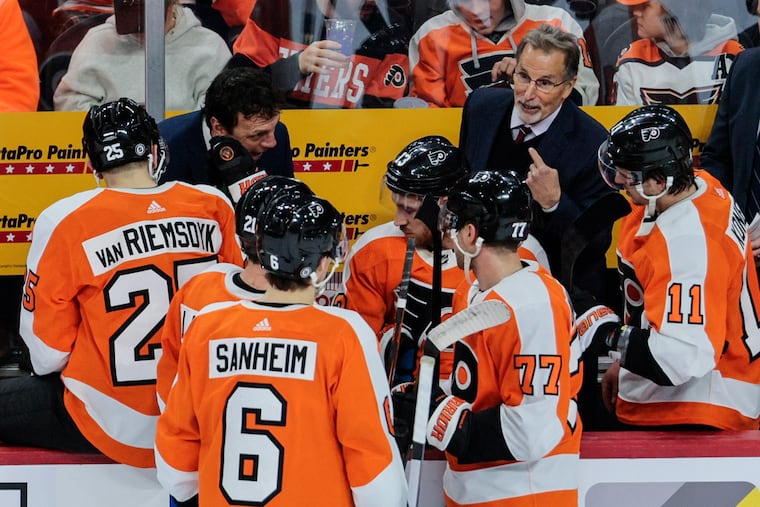John Tortorella spent this season testing his players. Not everyone responded to his liking.
In his season-ending exit interview Monday, Tortorella once again preached accountability and how it has helped him form his opinions of which players should stay and which should go.

John Tortorella wrapped up his first season with the Flyers the same way he started it: preaching accountability.
In his introductory news conference, he spoke about the importance of holding players accountable each day on the way to building a standard. While he knows more about who the individual players are after a season coaching them, he still believes they’re only at the beginning of that process.
“The accountability factor, as far as what’s expected, as far as play, as far as being a pro, conduct, practice habits, being a teammate, playing on a team concept, we’ve got some work to do,” Tortorella said.
He clarified he’s not talking about everyone. Through an “atrocious” season filled with brutal honesty, he said he learned a lot about certain players by pushing them and “holding them accountable.”
“And I have found out about people,” he said with certainty. “As far as people that simply don’t know what the word means. And I’m talking about players; some players just don’t want to be held accountable, or just can’t handle it.”
All of Tortorella’s tests start in a group setting, a “classroom setting,” as he called it. When going through film or on-ice drills, if he sees something he doesn’t like, he will share that with the player in front of everyone else. He wants the outer pressure to create inner pressure in the locker room until the point where the locker room “takes over itself.”
Tortorella enjoyed seeing which players pushed back, praising them for their “gumption.” When players “come back at” him, he said it solves the problem quicker because they’re “solving it as men.”
But talking back in a group setting isn’t for everyone, which is why Tortorella’s door is open for one-on-ones. Tortorella made it clear he doesn’t initiate private conversations, saying he’s “not going to chase them around the building for them,” but he said he’s always available. And some players took advantage of that, he said, naming Travis Konecny, Tony DeAngelo, and Morgan Frost as players who came to him to facilitate further conversations.
Accountability has to be built and learned, so Tortorella has to balance whether a player is simply learning to take accountability before deciding that the player simply isn’t accountable. He said he goes with his gut for that. When players give him a lot of “yeah, yeah” or “yeah, but ... ” responses, that’s not usually a good sign.
While he wouldn’t name specific players, there were definitely people who didn’t show Tortorella what he was looking for.
“I think we’re way too [damn] sensitive out here,” Tortorella said. “And about that, about simply coaching. That surprises me — not surprised, but that’s something that we’re gonna have to really grow at.”
Not everyone wants to be accountable, he said, because it’s hard. He also acknowledged that people look at that word in different ways.
“I think every coach, I think every organization, I think every player has a different definition for accountability,” Tortorella said. “And I just think it’s human nature. So that isn’t a bad thing. But when you’re in pro sport, and the coaching staff is here, we got our group of people, I guess that’s the process you’re going through and making sure you get that right definition — at least a definition [of] how I feel about it.”
Tortorella’s first season was about learning what he has. His first offseason will be about figuring out the next steps. With the firing of general manager Chuck Fletcher and the retirement of Comcast Spectacor chairman and Flyers governor Dave Scott, it’s clear the organization is at least attempting to move in a new direction. Tortorella said he’s only had brief conversations with “the Dans” (interim general manager Danny Brière and new CEO Dan Hilferty) and looks forward to more.
» READ MORE: Dan Hilferty and the Flyers are ushering out the old guard and finally charting a new path forward
Some organizations try to add before they subtract when in a rebuild, Tortorella said, but he thinks everyone is on the same page. They’re not going to go “chasing” after big-name free agents.
Tortorella and Brière might not be the only ones doing math. Players may decide they don’t want to be a part of the organization’s plans to rebuild. Tortorella acknowledged there could be clashes of personalities. However, he said those players would probably approach Brière before himself. Either way, he doesn’t want “nonbelievers” on his team.
Tortorella wouldn’t say there are “a lot” of players he wants to move on from, but he definitely has names in mind. Those names don’t just come down to the accountability factor. With the path he envisions for this team, he thinks the team needs to get younger. He expects several young players with the Lehigh Valley Phantoms to push for NHL roster spots next year. No spot is safe, he said, but the competition will come from within.
“We can’t change course — we’ve got to stay the course and let our kids develop,” Tortorella said. “I think backfilling is the most important part of it. And I know that we’re all on board with that.”
» READ MORE: The Flyers’ 25-and-under core’s late-season momentum provides hope for the future